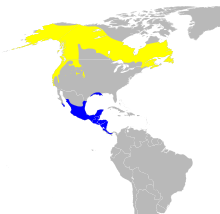Wilson's warbler
| Wilson's warbler | |
|---|---|
 |
|
| Adult male | |
| Scientific classification | |
| Kingdom: | Animalia |
| Phylum: | Chordata |
| Class: | Aves |
| Order: | Passeriformes |
| Family: | Parulidae |
| Genus: | Cardellina |
| Species: | C. pusilla |
| Binomial name | |
|
Cardellina pusilla (Wilson, 1811) |
|
 |
|
| Range of C. pusilla Breeding range Wintering range | |
| Synonyms | |
|
Wilsonia pusilla |
|
Wilsonia pusilla
Myiodioctes pusillus
The Wilson's warbler (Cardellina pusilla) is a small New World warbler. It is greenish above and yellow below, with rounded wings and a long, slim tail. The male has a black crown patch; depending on the subspecies, that mark is reduced or absent in the female. It breeds across Canada and south through the western United States, and winters from Mexico south through much of Central America. It is a very rare vagrant to western Europe.
The Wilson's warbler is a small passerine, ranging from 10 to 12 cm (3.9 to 4.7 in) in length, with a wingspan of 14–17 cm (5.5–6.7 in) and a mass of 5–10 g (0.18–0.35 oz). It has a plain green-brown back and yellow underparts. The male has a small black cap. Males of the western race C. p. chryseola are greener above and brighter than males of the eastern, nominate race. Individuals from Alaska and the west-central portion of the species' range average slightly larger than those found in eastern and Pacific coastal populations.
Its song is a chattering series of loud descending notes. The call is a flat "chuff".
The Wilson's warbler was first described in 1811 by the ornithologist Alexander Wilson, who placed it in the genus Muscicapa. The species was moved to Wilsonia by the naturalist and ornithologist Charles Lucien Bonaparte in 1838. Zoologist Thomas Nuttall moved it to Sylvania in 1840, and by 1845, many authors included it in Myiodioctes. In 1899, the American Ornithological Union returned the species to Wilsonia. The species is currently assigned to the genus Cardellina. The genus name Cardellina is a diminutive of the Italian dialect Cardella, a name for the European goldfinch, and the specific epithet pusilla means "very small".
...
Wikipedia

